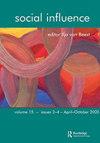欺骗:社会评论还是有效的营销工具?大学生对抗肥胖的宣传与预防信息框架测试
IF 0.6
3区 心理学
Q3 PSYCHOLOGY, SOCIAL
引用次数: 1
摘要
恶搞是模仿常规广告,试图阻止消费者使用或购买某些产品。利用监管焦点理论,本文的首要问题是,欺骗(促进与预防)是否作为反消费信息,以对抗大学生肥胖。在研究1中,采用了重复测量设计,参与者被展示了常规广告,然后是任何一个恶搞,而在研究2中,使用了受试者之间的设计,参与者被暴露在三个广告中的任何一个。两项研究的结果都证实了欺骗可能影响品牌,特别是购买意愿。两种恶搞的效果随广告的呈现顺序和反商业消费者反抗程度的不同而不同。讨论了理论和管理意义。本文章由计算机程序翻译,如有差异,请以英文原文为准。
Spoofing: social commentary or effective marketing tool? Testing promotion vs. prevention message frames in college students’ fight against obesity
Abstract Spoofs parody regular advertisements in an attempt to discourage consumers from using or buying certain products. Using regulatory focus theory, the overarching question in this paper was whether spoofs (promotion vs. prevention) act as anti-consumption messages to fight obesity among college students. In Study 1, a repeated measures design was employed where participants were shown the regular ad followed by either spoof, while in Study 2, a between-subjects design was used and participants were exposed to either one of the three ads. Findings from both studies confirmed that spoofing potentially impacts brands, specifically, purchase intentions. Effectiveness of either spoof varies with respect to the presentation order of the ads and levels of anti-commercial consumer rebellion. Theoretical and managerial implications are discussed.
求助全文
通过发布文献求助,成功后即可免费获取论文全文。
去求助
来源期刊

Social Influence
PSYCHOLOGY, SOCIAL-
CiteScore
1.50
自引率
0.00%
发文量
4
期刊介绍:
Social Influence is a journal that provides an integrated focus for research into this important, dynamic, and multi-disciplinary field. Topics covered include: conformity, norms, social influence tactics such as norm of reciprocity, authority, scarcity, interpersonal influence, persuasion, power, advertising, mass media effects, political persuasion, propaganda, comparative influence, compliance, minority influence, influence in groups, cultic influence, social movements, social contagions, rumors, resistance to influence, influence across cultures, and the history of influence research.
 求助内容:
求助内容: 应助结果提醒方式:
应助结果提醒方式:


